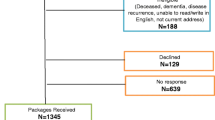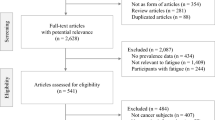Abstract
Background
Fatigue among patients with cancer is prevalent, disabling, and treatable. While fatigue management guidelines have been in place for a decade, their use remains unclear.
Methods
We surveyed 160 patients with stage IV lung (40), breast (40), colon (40), and prostate (40) cancer who reported moderate to severe fatigue (i.e., >5 of 10 on an 11-point numerical rating scale). Participants were queried about receipt of treatments in fatigue management domains emphasized in the National Comprehensive Cancer Network guidelines: general management strategies, activity enhancement, psychosocial strategies, and pharmaceuticals.
Results
The cohort was half male, had a mean age of 67, and reported an average fatigue rating of 6.4. Participants reported treatment or receipt of specific guidance in the fatigue management domains as follows: general management strategies 16.8 %, activity enhancement 11.9 %, psychosocial strategies 9.9 %, and pharmaceuticals 37.3 %. Fatigue >7 of 10 increased the likelihood of instruction in activity enhancement but no other domain.
Conclusion
The low rates of guideline-congruent treatment reported here are concerning, particularly as better validated behavioral treatments were the least prescribed.

Similar content being viewed by others
References
Luciani A, Jacobsen PB, Extermann M, Foa P, Marussi D, Overcash JA, Balducci L (2008) Fatigue and functional dependence in older cancer patients. Am J Clin Oncol 31(5):424–430
Curt GA (2000) Impact of fatigue on quality of life in oncology patients. Semin Hematol 37(4 Suppl 6):14–17
Cheville AL, Novotny P, Sloan JA, Basford JR, Wampfler J, Garces YI, Jatoi A, Yang P (2010) The value of concurrent symptoms in predicting clinical outcomes in lung cancer survivors. J Clin Oncol 28(No 15_suppl):6110
Kurtz ME, Kurtz JC, Given CW, Given B (2006) Predictors of use of health care services among elderly lung cancer patients: the first year after diagnosis. Support Care Cancer 14(3):243–250
Spelten ER, Verbeek JH, Uitterhoeve AL, Ansink AC, van der Lelie J, de Reijke TM, Kammeijer M, de Haes JC, Sprangers MA (2003) Cancer, fatigue and the return of patients to work—a prospective cohort study. Eur J Cancer 39(11):1562–1567
Barsevick AM, Dudley W, Beck S, Sweeney C, Whitmer K, Nail L (2004) A randomized clinical trial of energy conservation for patients with cancer-related fatigue. Cancer 100(6):1302–1310
Segal RJ, Reid RD, Courneya KS, Sigal RJ, Kenny GP, Prud'Homme DG, Malone SC, Wells GA, Scott CG, Slovinec D'Angelo ME (2009) Randomized controlled trial of resistance or aerobic exercise in men receiving radiation therapy for prostate cancer. J Clin Oncol 27(3):344–351
Pinto BM, Frierson GM, Rabin C, Trunzo JJ, Marcus BH (2005) Home-based physical activity intervention for breast cancer patients. J Clin Oncol 23(15):3577–3587
Mock V, Frangakis C, Davidson NE, Ropka ME, Pickett M, Poniatowski B, Stewart KJ, Cameron L, Zawacki K, Podewils LJ et al (2005) Exercise manages fatigue during breast cancer treatment: a randomized controlled trial. Psychooncology 14(6):464–477
Jacobsen PB, Meade CD, Stein KD, Chirikos TN, Small BJ, Ruckdeschel JC (2002) Efficacy and costs of two forms of stress management training for cancer patients undergoing chemotherapy. J Clin Oncol 20(12):2851–2862
Clinical practice guidelines in oncology: cancer-related fatigue, v1.2006. http://www.nccn.org/professionals/physician_glf/PDF/fatigue.pdf. Accessed 17 Jan 2012
Vogelzang NJ, Breitbart W, Cella D, Curt GA, Groopman JE, Horning SJ, Itri LM, Johnson DH, Scherr SL, Portenoy RK (1997) Patient, caregiver, and oncologist perceptions of cancer-related fatigue: results of a tripart assessment survey. The Fatigue Coalition. Semin Hematol 34(3 Suppl 2):4–12
Cleeland CS, Gonin R, Hatfield AK, Edmonson JH, Blum RH, Stewart JA, Pandya KJ (1994) Pain and its treatment in outpatients with metastatic cancer. N Engl J Med 330(9):592–596
Cheville AL, Beck LA, Petersen TL, Marks RS, Gamble GL (2009) The detection and treatment of cancer-related functional problems in an outpatient setting. Support Care Cancer 17(1):61–67
Chang YJ, Lee JS, Lee CG, Lee WS, Lee KS, Bang SM, Wang XS, Mendoza TR, Cleeland CS, Yun YH (2007) Assessment of clinical relevant fatigue level in cancer. Support Care Cancer 15(7):891–896
Hofman M, Ryan JL, Figueroa-Moseley CD, Jean-Pierre P, Morrow GR (2007) Cancer-related fatigue: the scale of the problem. Oncologist 12(Suppl 1):4–10
Kwon YC, Yun YH, Lee KH, Son KY, Park SM, Chang YJ, Wang XS, Mendoza TR, Cleeland CS (2006) Symptoms in the lives of terminal cancer patients: which is the most important? Oncology 71(1–2):69–76
NCI Community Cancer Centers Program Pilot: 2007–2010. http://ncccp.cancer.gov/Media/FactSheet.htm. Accessed 17 Jan 2012
Cramp F, Daniel J (2008) Exercise for the management of cancer-related fatigue in adults. Cochrane Database Syst Rev (2):CD006145
Goedendorp MM, Gielissen MF, Verhagen CA, Bleijenberg G (2009) Psychosocial interventions for reducing fatigue during cancer treatment in adults. Cochrane Database Syst Rev (1):CD006953
Cheville AL, Troxel AB, Basford JR, Kornblith AB (2008) Prevalence and treatment patterns of physical impairments in patients with metastatic breast cancer. J Clin Oncol 26(16):2621–2629
Guadagnoli E, Mor V (1991) Daily living needs of cancer outpatients. J Commun Health 16(1):37–47
Lehmann JF, DeLisa JA, Warren CG, deLateur BJ, Bryant PL, Nicholson CG (1978) Cancer rehabilitation: assessment of need, development, and evaluation of a model of care. Arch Phys Med Rehabil 59(9):410–419
Rosenbloom SK, Victorson DE, Hahn EA, Peterman AH, Cella D (2007) Assessment is not enough: a randomized controlled trial of the effects of HRQL assessment on quality of life and satisfaction in oncology clinical practice. Psychooncology 16(12):1069–1079
Mills ME, Murray LJ, Johnston BT, Cardwell C, Donnelly M (2009) Does a patient-held quality-of-life diary benefit patients with inoperable lung cancer? J Clin Oncol 27(1):70–77
Berger A (2003) Treating fatigue in cancer patients. Oncologist 8(Suppl 1):10–14
Valgus J, Jarr S, Schwartz R, Rice M, Bernard SA (2010) Pharmacist-led, interdisciplinary model for delivery of supportive care in the ambulatory cancer clinic setting. J Oncol Pract 6(6):e1–e4
Abernethy AP, Ahmad A, Zafar SY, Wheeler JL, Reese JB, Lyerly HK (2010) Electronic patient-reported data capture as a foundation of rapid learning cancer care. Med Care 48(6 Suppl):S32–S38
DuBenske LL, Gustafson DH, Shaw BR, Cleary JF (2010) Web-based cancer communication and decision making systems: connecting patients, caregivers, and clinicians for improved health outcomes. Med Decis Making 30(6):732–744
Author information
Authors and Affiliations
Corresponding author
Rights and permissions
About this article
Cite this article
Cheville, A.L., Shen, T., Chang, M. et al. Appropriateness of the treatment of fatigued patients with stage IV cancer. Support Care Cancer 21, 229–233 (2013). https://doi.org/10.1007/s00520-012-1515-7
Received:
Accepted:
Published:
Issue Date:
DOI: https://doi.org/10.1007/s00520-012-1515-7




